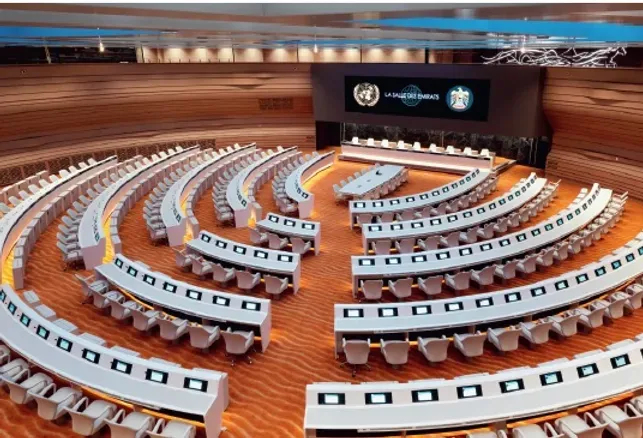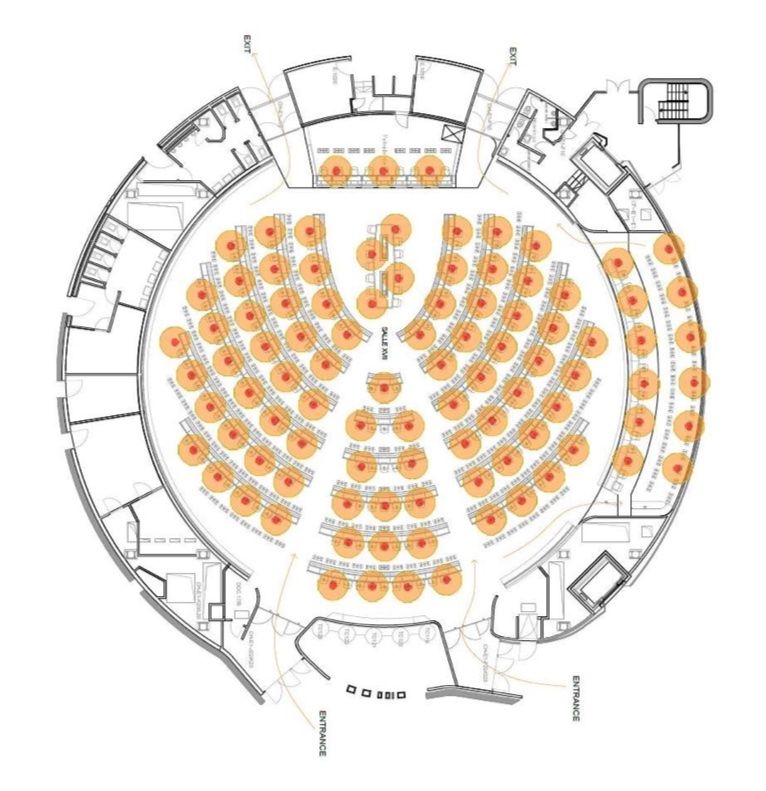Dancing With the Virus. A whole new diplomatic ballet
The Palais des Nations will soon awake from the Covid-19 induced sedation it has been put under since March 16.
The Palais des Nations will soon awake from the Covid-19 induced coma it has been put under since March 16, the day the Swiss government announced its first measures to fight the pandemic. "I can't wait," admits with evident relief a senior Western diplomat posted here. After two months of isolation at his residence, he describes his working days "as an endless series of virtual meetings that leave you drained at the end of the day and, oddly, with the feeling that you haven't achieved anything."
Slowly, carefully and voluntarily
"It will be slow, careful—and for the roughly 1600 strong staff—voluntary" Alessandra Vellucci, the United Nations Office in Geneva (UNOG) spokeswoman, tells me over the phone. A message emphatically restated in the traditional diplomatic use of a note verbale sent last Friday by Tatiana Valovaya, UNOG Director, to the permanent missions, international organizations in Geneva, and the broader UN system. "Ever since the gradual easing in late April of some of the restrictions, in response to requests by a number of member states, UNOG has been at work," she writes, "to plan for a safe, controlled, and gradual resumption of the meetings of intergovernmental and expert bodies"—meetings on the UN General Assembly schedule.
"The entire Palais has been surveyed, pedestrian flows analyzed, signage designed."
"A steering committee chaired by Mrs. Valovaya was set-up very early on," explains Alessandra Vellucci. "Since mid-May, UNOG staff has been hard at work every day to assess what there was to do to comply with the requirements of the Federal Authorities as host-country and the sanitary precautions recommended by the WHO. Essentially, the entire Palais has been surveyed, pedestrian flows analyzed, signage designed."
As it stands now, the gradual reopening should happen on June 8 as the Swiss government will announce further easing of the current restrictions tomorrow, May 27. “The gradual return to UNOG’s office will be limited to 30% of staff. We will closely monitor the situation before deciding on any increase. We are looking at different scenarios, like rotating people. Flexibility will be the keyword and the managers of UNOG’s entities have been given a high degree of latitude to make decisions,” explains Alessandra Vellucci.
According to UNOG's note, the resumption of meetings "can be done and is foreseen in three ways: a very limited number of physical meetings with interpretation, in selected conference rooms of the Palais des Nations, in strict compliance with hygiene and social distancing rules; virtual and/or hybrid meetings with, or without interpretation." (…) "As the priority remains the security, safety, and well-being of all delegates, United Nations staff, and other potential meeting participants, access to meetings can only be authorized for a very small number of persons." Missions are requested to send only one delegate per event.
Detailed guidelines
One of the three annexes attached to the note verbale describes in detail the guidelines for the use of the premises, from the access to the Palais and the pedestrian traffic flow to the arrangements around the physical distancing requirements. "The overarching principle (…) is keeping the number of persons at the Palais at any one time to the lowest levels possible." Like every other organization, the UN will have to dance with the virus. Its choreography is comprehensive. Annex II offers a graphic illustration of the changes ahead. Meeting room by meeting room, UNOG's team has meticulously mapped the spaces to put them in compliance with the requirements. The Council Chamber normal capacity is 545 people. It's now down to 55. The Assembly Hall is down from 1969 to 475.
The annex explains:
"To ensure the required 2 meters physical distance, when entering and exiting the conference rooms, separate doors have been assigned as either entrance door or exit door. Within the conference rooms, participants will be asked to keep the required 2 meters of physical distance at all times and to circulate clockwise only, which will be indicated by appropriate signage. The maximum occupancy of all conference rooms has been altered to ensure the required physical distance, and seats will be blocked off to discourage people from sitting too close to one another."

In its Covid-19 configuration, the redesigned Room XVII, pictured above, goes from 556 to 111 seats and looks like this, each yellow dot representing a 2-meter wide safe space:

Provisions have also been made for people that may feel unwell on the premises. "UNOG asks that any delegate who feels even slightly sick not come to the premises." In the unfortunate event that someone might experience symptoms while at the Palais, "security will make an initial assessment and call the Medical Service doctor if they judge necessary." Wearing masks will not be made mandatory. "However, anyone who wishes to wear one is free to do so," says UNOG's note.
There is something clearly "contre nature" in UNOG's carefully designed plan. Physical distancing seems utterly incompatible with the diplomatic practice, with the very art of negotiating, which requires human interaction in all its dimensions. The Palais is slowly coming back to life. But it might still feel a bit groggy for quite a while.
